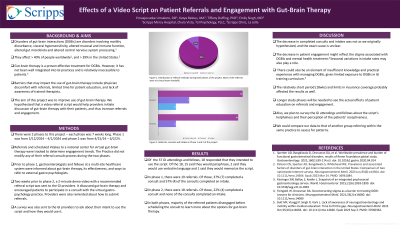Sunday Poster Session
Category: Functional Bowel Disease
P0646 - Effects of a Video Script on Patient Referrals and Engagement With Gut-Brain Therapy
Sunday, October 27, 2024
3:30 PM - 7:00 PM ET
Location: Exhibit Hall E

Has Audio

Emuejevuoke Umukoro, DO
Scripps Mercy Hospital
San Ysidro, CA
Presenting Author(s)
Emuejevuoke Umukoro, DO1, Katya Belous, MA2, Tiffany M. Duffing, PhD3, Emily Singh, MD4
1Scripps Mercy Hospital, San Ysidro, CA; 2Liberty University, Lynchburg, VA; 3GI Psychology, Fairfax Station, VA; 4Scripps Health, San Diego, CA
Introduction: Gut-brain therapy has been proven an effective treatment method for those with disorders of gut-brain interaction. However, its use in comprehensive patient care is lacking. Barriers include physician discomfort with referrals, limited time for education, and lack of awareness of therapists trained in this area. We hypothesized that a video referral script would help providers discuss gut-brain therapy with their patients, increasing referrals and treatment follow-through.
Methods: The project had 2 phases; each phase was 7 weeks long. In Phase 1, GI providers and fellows at a multi-site healthcare system were presented with information about gut-brain therapy and its effectiveness. We then tracked the number of patient referrals and intakes for 7 weeks. In Phase 2, we sent a video referral script to help the same providers discuss gut-brain therapy and encourage patients to participate in a consult with a virtual gastro-psychology practice. Also, a survey was sent to understand how the script would be used. After 2 weeks of the video script and survey, we tracked the number of patient referrals and intakes for the next 7 weeks. Referrals were primarily virtual warm handoffs or direct referrals.
Results: In Phase 1, there were 19 referrals. 37% (7) completed a consult and 57% (4) of the consults completed an intake. In Phase 2, there were 18 referrals. 22% (4) completed a consult and none of the consults completed an intake. In both phases, the majority of the patients referred to the virtual gastro-psychology practice disengaged before scheduling the consult to learn more about the options for gut-brain therapy.
Discussion: Results showed a slight decrease in referrals despite the video script and free consults. Potential explanations include seasonal variations in intake rates and the stigma associated with disorders of gut-brain interaction and mental health treatment. Of note, the gastro-psychology services evaluated in this study are self-pay and not usually covered as in-network health benefits. As a follow-up to these results, we plan to survey GI providers about the script’s helpfulness and compare our data to another group referring to the gastro-psychology practice. Longer study phases may be needed to see the true effects of patient education on referrals.
Disclosures:
Emuejevuoke Umukoro, DO1, Katya Belous, MA2, Tiffany M. Duffing, PhD3, Emily Singh, MD4. P0646 - Effects of a Video Script on Patient Referrals and Engagement With Gut-Brain Therapy, ACG 2024 Annual Scientific Meeting Abstracts. Philadelphia, PA: American College of Gastroenterology.
1Scripps Mercy Hospital, San Ysidro, CA; 2Liberty University, Lynchburg, VA; 3GI Psychology, Fairfax Station, VA; 4Scripps Health, San Diego, CA
Introduction: Gut-brain therapy has been proven an effective treatment method for those with disorders of gut-brain interaction. However, its use in comprehensive patient care is lacking. Barriers include physician discomfort with referrals, limited time for education, and lack of awareness of therapists trained in this area. We hypothesized that a video referral script would help providers discuss gut-brain therapy with their patients, increasing referrals and treatment follow-through.
Methods: The project had 2 phases; each phase was 7 weeks long. In Phase 1, GI providers and fellows at a multi-site healthcare system were presented with information about gut-brain therapy and its effectiveness. We then tracked the number of patient referrals and intakes for 7 weeks. In Phase 2, we sent a video referral script to help the same providers discuss gut-brain therapy and encourage patients to participate in a consult with a virtual gastro-psychology practice. Also, a survey was sent to understand how the script would be used. After 2 weeks of the video script and survey, we tracked the number of patient referrals and intakes for the next 7 weeks. Referrals were primarily virtual warm handoffs or direct referrals.
Results: In Phase 1, there were 19 referrals. 37% (7) completed a consult and 57% (4) of the consults completed an intake. In Phase 2, there were 18 referrals. 22% (4) completed a consult and none of the consults completed an intake. In both phases, the majority of the patients referred to the virtual gastro-psychology practice disengaged before scheduling the consult to learn more about the options for gut-brain therapy.
Discussion: Results showed a slight decrease in referrals despite the video script and free consults. Potential explanations include seasonal variations in intake rates and the stigma associated with disorders of gut-brain interaction and mental health treatment. Of note, the gastro-psychology services evaluated in this study are self-pay and not usually covered as in-network health benefits. As a follow-up to these results, we plan to survey GI providers about the script’s helpfulness and compare our data to another group referring to the gastro-psychology practice. Longer study phases may be needed to see the true effects of patient education on referrals.
Disclosures:
Emuejevuoke Umukoro indicated no relevant financial relationships.
Katya Belous: GI Psychology – Employee.
Tiffany Duffing: Gastro Girl Digestive Health Insights – Advisory Committee/Board Member. GI Psychology – Employee.
Emily Singh indicated no relevant financial relationships.
Emuejevuoke Umukoro, DO1, Katya Belous, MA2, Tiffany M. Duffing, PhD3, Emily Singh, MD4. P0646 - Effects of a Video Script on Patient Referrals and Engagement With Gut-Brain Therapy, ACG 2024 Annual Scientific Meeting Abstracts. Philadelphia, PA: American College of Gastroenterology.
